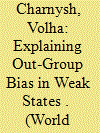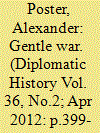| Srl | Item |
| 1 |
ID:
185604


|
|
|
|
|
| Summary/Abstract |
Two dominant explanations for ethnic bias in distributional outcomes are electoral incentives and out-group prejudice. This article proposes a novel and complementary explanation for the phenomenon: variation in legibility across ethnic groups. The author argues that states will allocate fewer resources to groups from which they cannot gather accurate information or collect taxes. The argument is supported by original data on state aid from the 1891/1892 famine in the Russian Empire. Qualitative and quantitative analyses show that districts with a larger Muslim population experienced higher famine mortality and received less generous public assistance. The Muslims, historically ruled via religious intermediaries, were less legible to state officials and generated lower fiscal revenues. State officials could not count on the repayment of food loans or collect tax arrears from Muslim communes, so they were more likely to withhold aid. State relief did not vary with the presence of other minorities that were more legible and generated more revenue.
|
|
|
|
|
|
|
|
|
|
|
|
|
|
|
|
| 2 |
ID:
112150


|
|
|
|
|
| Publication |
2012.
|
| Summary/Abstract |
Alexander Poster's article, "The Gentle War: Famine Relief, Politics, and Privatization in Ethiopia-1983-1986" examines the Reagan administration's efforts to resolve Cold War disputes through humanitarian assistance. With the Vietnam War fresh in minds of both Congress and the American public, Reagan officials dealt with hesitancy when they pressed for military and developmental grants for foreign nations. M. Peter McPherson, administrator for the Agency for International Development, discovered a solution to the Reagan administration's problem. McPherson noted that Americans still supported humanitarian objectives abroad and sought to incorporate humanitarian relief into President Reagan's foreign policy strategy. The Ethiopian famine of the mid-1980s resulted in the largest mobilization of relief resources in U.S. history. The American response was both a humanitarian effort and a targeted attempt to discredit socialist dictator Mengistu Haile Mariam. American policymakers drew up their policy with the intent to strengthen rebel areas, discourage collectivization of land, and take credit for most of the relief effort. Thus, disaster relief in Ethiopia served a dual purpose: to provide humanitarian aid and to further American security interests.
|
|
|
|
|
|
|
|
|
|
|
|
|
|
|
|